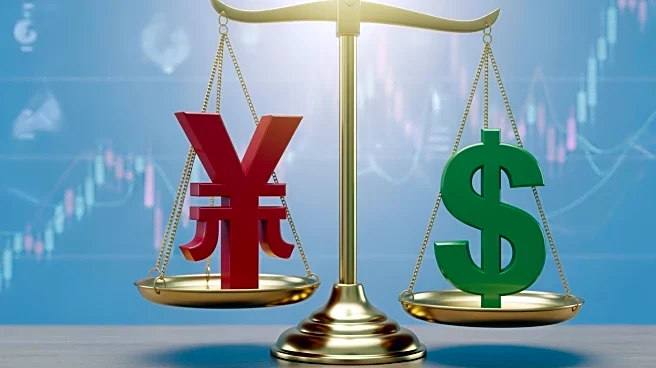What's Happening?
Ethiopia, a member of the BRICS group, is in discussions with China to convert its $5.38 billion worth of loans from the US dollar into the Chinese yuan. This move is aimed at strengthening Ethiopia's
local currency in the forex markets and saving millions in foreign exchange rates. The conversion to yuan-denominated loans is seen as a cost-effective alternative to settling payments in US dollars. Ethiopia's central bank Governor, Eyob Tekalign, is leading the discussions with China, emphasizing the growing trade and investment relationship between the two countries. Although China has not yet responded to Ethiopia's request, the People’s Bank of China is likely to approve the conversion, aligning with China's strategy to internationalize the yuan.
Why It's Important?
The potential shift from US dollar to Chinese yuan for loan settlements by BRICS members signifies a major change in global financial dynamics. If more countries follow Ethiopia's lead, it could weaken the dominance of the US dollar in international trade and finance, ushering in a multipolar currency world. This development could impact the US economy by reducing its influence over global financial markets. Countries adopting yuan-denominated loans may benefit from reduced foreign exchange costs, enhancing their economic stability. The move also reflects China's growing influence in global finance, as it seeks to position the yuan as a viable alternative to the dollar.
What's Next?
If Ethiopia successfully converts its loans to yuan, other BRICS members might consider similar actions, potentially accelerating the de-dollarization trend. This could lead to increased currency swaps and bilateral trade agreements denominated in local currencies. The US may need to reassess its financial strategies to maintain its currency's global standing. Additionally, China might intensify efforts to promote the yuan in international markets, possibly leading to new financial alliances and trade partnerships. The outcome of Ethiopia's negotiations with China could set a precedent for other nations seeking to diversify their currency reserves.
Beyond the Headlines
The shift towards yuan-denominated loans raises questions about the long-term implications for global economic governance. As more countries explore alternatives to the US dollar, there could be significant changes in international monetary policies and financial regulations. This trend might also influence geopolitical relations, as countries align their economic strategies with emerging financial powers like China. The ethical considerations of such shifts include the potential impact on developing economies reliant on dollar-based trade and the need for equitable access to financial resources.








